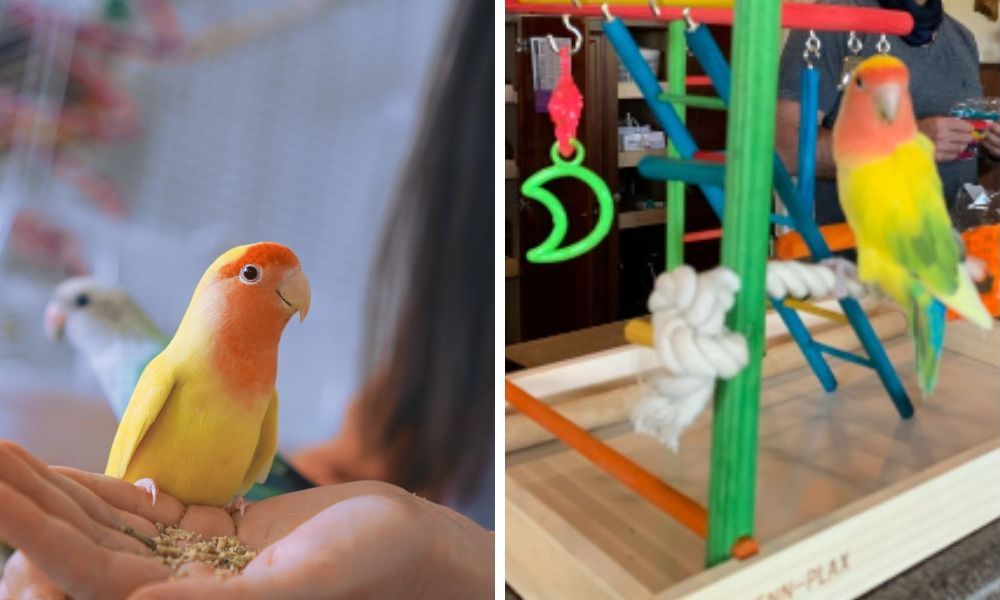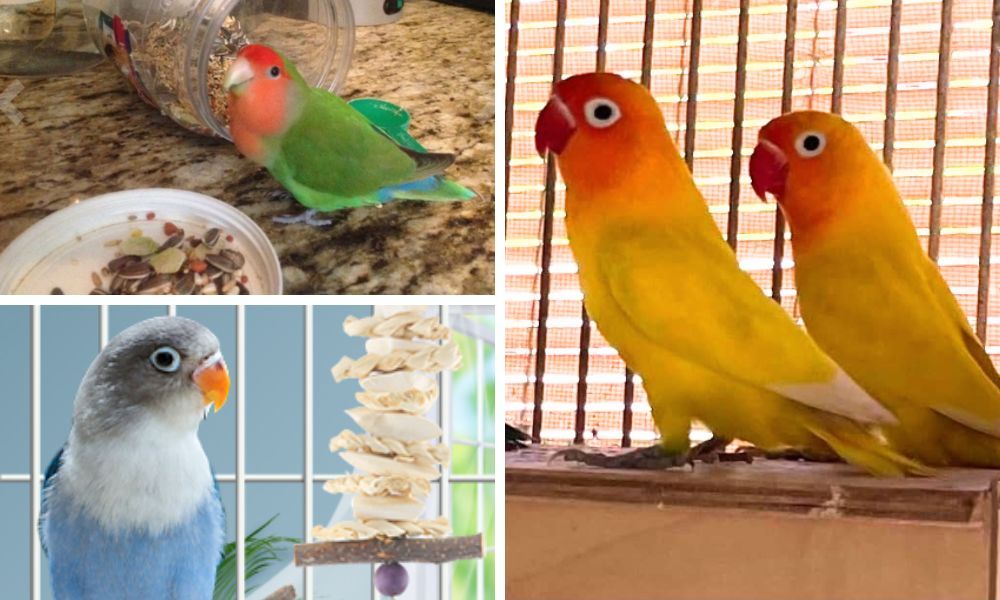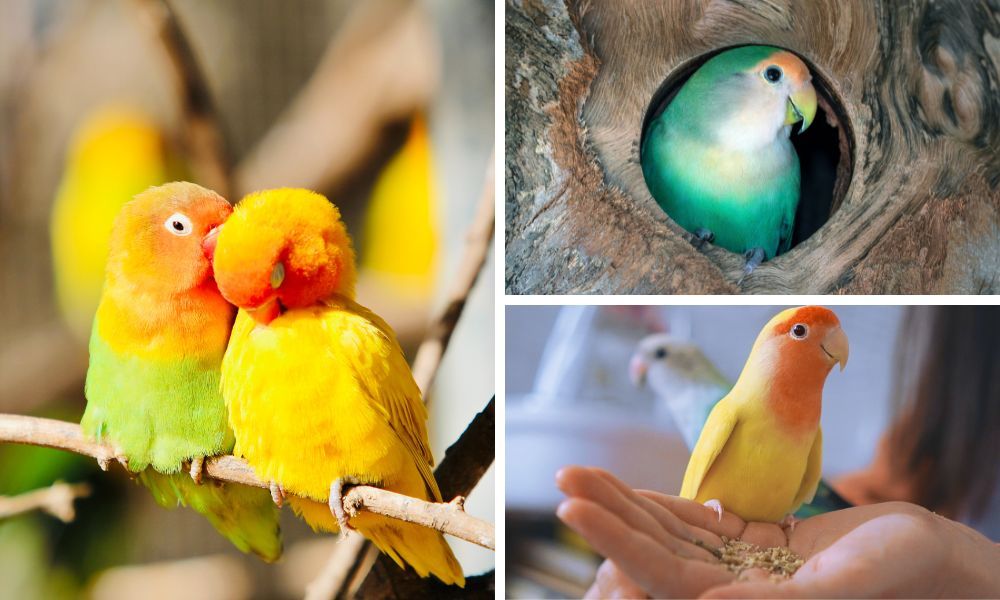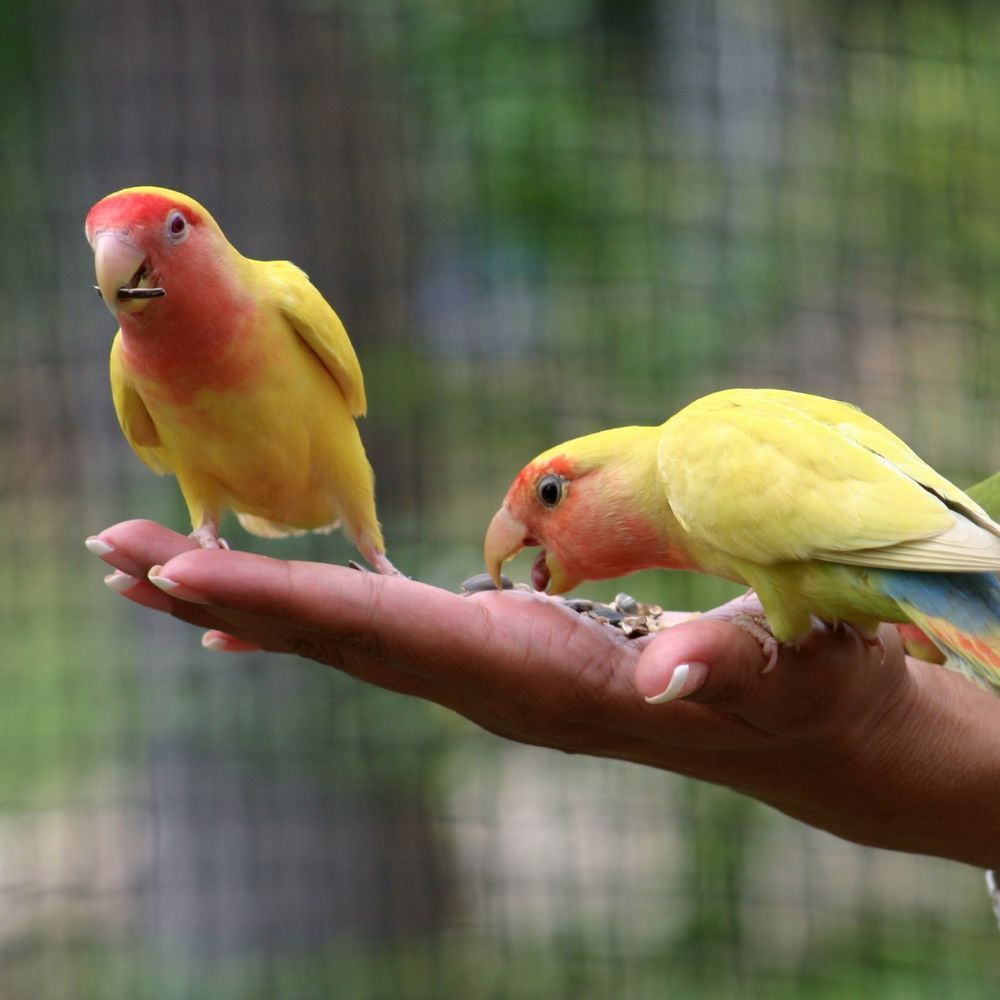The Role of Fresh Love Birds Food in a Lovebird's Diet: Hydration, Nutrients, and Variety
Are you wondering what to feed your lovebirds? In this blog, we're breaking down the key components of a balanced diet for lovebirds, including hydration, nutrients, and variety.

Lovebirds are delightful, friendly, and curious birds that require the proper diet to keep them healthy and happy. One way to ensure your lovebirds stay healthy is by offering fresh love birds food in their diet. Fresh food not only provides hydration but also offers essential nutrients that do wonders for their health. In this blog post, we will discuss the importance of fresh foods in a lovebird's diet, the benefits of hydration, the nutrients they need, and the variety in their diet.
Importance of Fresh Foods in Lovebirds' Diet
Fresh foods are an essential part of a lovebird's diet. They provide natural hydration, healthy vitamins, and offer mental stimulation. In the wild, lovebirds forage for foods that are natural, fresh, and nutritious. Fresh foods also help to break the monotony of being fed only seed-based diets that are not enough for an active lovebird. Fresh foods encourage the physical activity of a bird, and the movement needed to prepare and eat fresh food keeps them mentally stimulated and healthy.
Benefit of Hydration
Hydration is essential for lovebirds' digestive health. A lack of water can cause constipation, dehydration, and, in severe cases, death. By providing fresh foods such as fruits, vegetables, and leafy greens, lovebirds get the water needed to keep their digestive system working correctly. The water in fresh foods also helps to flush out any toxins and helps keep the kidneys functioning correctly. A lack of water in seed-based diets can also lead to heart and liver damage.
Nutrients for Lovebirds
Fresh foods offer a wide range of nutrients that help keep lovebirds healthy. Vitamin A, for example, is crucial for healthy feather growth, reproduction, good eyesight, and a healthy immune system. Vegetables such as sweet potato, pumpkin, carrots, and kale are natural sources of this vitamin. Fresh foods, such as papaya, kiwi, oranges, and strawberries, contain high amounts of vitamin C, which is essential for the development of healthy bones and tissue, as well as keeping the immune system healthy.
Variety in Lovebirds' Diet
A monotonous diet can lead to boredom and an unhealthy bird. Offering a variety of fresh foods encourages lovebirds to explore new tastes and textures. Fresh foods also provide a break from the monotony of seed-only diets, which can lead to obesity, feather-picking, and other health issues. Lovers of lovebirds can offer variety by introducing new fruits, vegetables, and grains in small amounts and observing their lovebird's reaction to the new diet carefully. Furthermore, nuts, legumes, and eggs can be offered as occasional treats.

FAQs
What is the best bird food for lovebirds?
The best bird food for lovebirds is a combination of fresh fruits, vegetables, and grains. This will provide them with the necessary nutrients they need to stay healthy, while offering mental stimulation and variety at the same time.
How often should I feed my lovebird fresh foods?
It's recommended that you offer your lovebird fresh foods several times a week. It's important to monitor your lovebird's response carefully and adjust the amount of food offered as needed. Additionally, it's also important to offer foods in combination with seed-based diets to provide variety.
What fruits are safe for lovebirds?
Safe fruits for lovebirds include bananas, apples, oranges, kiwis, strawberries, papayas, and melons. However, it's important to note that some fruits are toxic for pet birds. These include avocados, grapes, and raisins. Additionally, pitted fruit should never be given to lovebirds as the pit can cause choking or block their digestive system.
What feed do lovebirds eat?
Lovebirds eat a variety of foods, including seed-based diets, fruits and fresh vegetables, nuts, legumes, eggs, and grains. It's important to provide a balanced and varied diet for your lovebird by offering all of these sources in moderation. Additionally, it's also important to offer fresh food several times a week to provide hydration and essential nutrients that help keep your lovebird healthy and happy. On Amazon, you can find an assortment of lovebird food to help even the pickiest of birds. You can read our complete guide to Balanced Love Birds Food here.

What Lovebird food is safe for my bird?
It's important to provide your lovebird with a balanced diet, which includes fresh fruits and vegetables, as well as seed-based diets. Additionally, nuts, legumes, eggs, and grains can be offered occasionally as treats. It's important to ensure the food you purchase is free of preservatives, artificial colors, and flavors. On Amazon you can find an assortment of safe love birds food that is specially formulated for pet birds. Additionally, you should avoid foods that contain high levels of sugar or fat. By offering a variety of healthy food for your lovebird, they will be sure to enjoy all the benefits of a balanced diet.
Is there anything else I can do to ensure my Lovebird stays healthy?
Aside from providing a balanced diet, there are several other things you can do to ensure your lovebird stays healthy. Providing your lovebird bird food with proper ingredients an adequate amount of exercise is essential for their physical and mental wellbeing. Additionally, keeping their living space clean and providing them with ample toys will also contribute to a healthier lifestyle. Another important factor in maintaining the health of your bird is regular checkups and veterinary visits. This will help to ensure that any health issues are caught early on and addressed as soon as possible. It's important to make sure your lovebird is getting enough sleep to ensure they remain alert and engaged throughout the day. By following these guidelines, you can ensure they lead a long and healthy life.
What vegetables do lovebirds eat?
Lovebirds can eat a variety of vegetables, including sweet potatoes, pumpkin, carrots, kale, spinach, and cabbage. It's important to offer vegetables in moderation and to monitor your lovebird's response carefully before introducing any new foods into the bird's diet. Lovebirds eat a variety of vegetation such as leaf buds in the wild. Additionally, it's also essential to remove any uneaten vegetables from the cage as they may spoil quickly. Read more what Love Birds eat in the wild below.

What seed are good for my lovebird?
Most lovebirds are usually fed a diet that consists of seeds. Good seeds for lovebirds include millet, canary seed,sunflower seeds, oats, and sunflower. Additionally, it's important to provide a variety of different types of seeds as this will ensure your lovebird gets all the essential nutrients they need. It's also recommended that you soak the seeds before offering them to your lovebird to make them softer and easier to digest. Additionally you can pick a high-quality seed mix to give the bird as a treat. Look for a seed mix that has a wide variety of seeds like millet, canary grass seed, hulled oats, niger seed, flax seed, sunflower seeds, safflower, and grape seeds. Seed blend loved by birds includes red millet, white millet, veggie pellets etc.
What food can lovebirds not eat?
Lovebirds should not eat avocados, grapes, and raisins as these fruits can be toxic to them. Additionally, pitted fruit should also be avoided as the pit can cause choking or block their digestive system. It's also important to avoid any processed foods such as chips, cookies, and candies as these are unhealthy for pet birds. Lastly, it's essential to remove any uneaten fresh foods from the cage as these may spoil quickly.
What is the best way to feed my lovebird?
The best way to feed your lovebird is by offering a combination of seed-based diets, fruits and vegetables, nuts, legumes, eggs, and grains. This will provide them with the necessary nutrients they need to stay healthy, while offering mental stimulation and variety at the same time. Additionally, it's important to offer fresh and nutritious food several times a week to provide hydration and essential nutrients that help keep your lovebird healthy and happy. Furthermore, it's also essential to monitor their reaction when introducing new foods into bird's diet.
How much water should I give my lovebird?
Lovebirds should have access to clean, fresh water at all times. This helps keep their digestive system working correctly and also flushes out any toxins. Additionally, it's important to change the water daily and ensure that no food or debris falls into the bowl as this can contaminate it. Furthermore, it's essential to provide clean source of hydration such as water bottles or bubblers to keep the bird hydrated.
What to keep in mind when feeding lovebirds?
When feeding lovebirds and other pet birds, it's important to provide a balanced and healthy diet as this will ensure your lovebird gets all the essential nutrients they need. Additionally, it's also important to offer fresh food several times a week to provide hydration and essential nutrients that help keep your lovebird healthy and happy. You can read more about best love birds food here or by clicking the picture below.

Is pelleted food good for lovebirds?
Yes, pelleted food can be a good option for lovebirds as it contains all the essential nutrients they need to stay healthy. However, it's important to note that pelleted diet should not replace fresh foods and should only be offered in combination with other diets. Additionally, it's essential to monitor your bird's reaction when introducing new food into their diet.
How to feed baby lovebirds?
It's important to provide baby lovebirds with a high-quality diet, as this will help them grow healthy and strong. A good option is to feed them a combination of freshly hatched baby bird formula, fruits and vegetables, eggs,and legumes. Additionally, it's important to offer food several times a day and adjust the amount offered as needed. It's also essential to monitor their reaction when introducing new foods into the bird's diet. Additionally, it's important to offer a calcium supplement and vitamins to help your baby lovebird stay healthy. Lastly, always provide clean water for your baby lovebird and change it daily.
At the end...
To conclude, fresh foods are essential to keep your lovebirds healthy and happy. Lovebirds need variety in their balanced diet, natural hydration, and essential nutrients to maintain their digestive health, growth, feather health, and overall mental and physical well-being. As lovebird caretakers, it's our responsibility to provide fresh food in their diet, which includes a rotation of fresh fruits, vegetables, and grains. When you offer your lovebird a balanced diet with the right nutrients, they will thrive and reward you with their love and affection. With a little bit of effort and care, you can create an optimal nutrition plan that gives your lovebird a happier and healthier life! Shop now for Lovebird Bird Food and start saving today.

